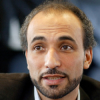Tariq Ramadan

Tariq Ramadan
Tariq Ramadanis a Swiss academic, philosopher and writer. He is the professor of Contemporary Islamic Studies in the Faculty of Oriental Studies at St Antony's College, Oxford and also teaches at the Oxford Faculty of Theology. He is a visiting professor at the Faculty of Islamic Studies, the Université Mundiapolisand several other universities around world. He is also a senior research fellow at Doshisha University. He is the director of the Research Centre of Islamic Legislation and Ethics, based in...
NationalitySwiss
ProfessionWriter
Date of Birth26 August 1962
CountrySwitzerland
The fact that Western Muslims are free means that they can have enormous impact. But it would be wrong to claim that we are imposing our ways on the West. New ideas are now coming from the West. To be traditional is not so much a question of protecting ourselves as to be traditionalist in principle.
It is of the highest importance to provide equal access to the labour market. Governments should act to establish equitable employment standards and penalise racial discrimination.
In the name of the rule of law, democracy and human rights, we cannot accept that the rights of individuals (Arab or Muslim) be trampled upon, or that populations are targeted and discriminated against in the name of the war against terrorism.
The great majority of Americans do not know much about Islam but nonetheless fear it as violent, expansionist and alien to their society. The problem to overcome is not hatred, but ignorance.
There is an enormous amount of mistrust towards me. They say that what I'm saying is too good to be true, and that I must say something else when I speak in Arabic. Trust is missing, the progress made is not acknowledged.
While criticism of Israel is legitimate and justifiable, it cannot be an excuse - in any way, shape or form - for anti-Semitism.
When Manuel Valls says there's nothing to understand because "understanding is justifying," he echoes back to Georges W Bush's logic in 2001. When François Hollande says "they are attacking us because of who we are," what does it say about victims in Mali, Baghdad, Ivory Coast or Turkey?
We should say to the West: "You have been supporting dictators for too many years. Don't expect the people to introduce democracy over night. It is going to take time." It took time with the French revolution, it took time with the Eastern European revolutions. And it is going to take time there.
What I see now is that even with the Islamists, who have been portraying themselves as the alternative to corruption and dictatorship and in defence of more transparency, there is one respect in which they have now changed completely. Since the beginning of the 1920's, Islamism was very close in positioning in some respects to 'liberation theology'. But that is no longer the case.
The problem is that the constitution should have been and was an opportunity, exactly as Moncef Marzouki tried to do, to bring together the secularists and Islamists.
You can be a very charitable capitalist. Like [Nicola] Sarkozy was saying, we have to 'moralise capitalism', which for me is a contradiction in terms.
It is like using a smoke screen, the same thing for an individual. The topic here is Islam. If French politicians are no longer talking about Islam, they know they will have to talk about something else, which brings the spotlight on their inefficiency. They will have to talk about domestic social and economic issues and they will have to justify their foreign policy, which is obviously something they need to avoid at all costs.
When terrorism is directly aiming at Western countries, it is automatically and abnormally enlarged in order to instill emotions and fear. However, when attacks happen in the Middle East, is it conveniently downplayed and less talked about. Unless they would benefit more from a heavy coverage.
Globalisation means indeed everything is global but there are still very specific centres of power, especially when it comes to media and news.Misinformation about some attacks is going to affect how emotionally involved the audience is going to get. In the end, an emotional ranking is artificially created when it comes to casualties.